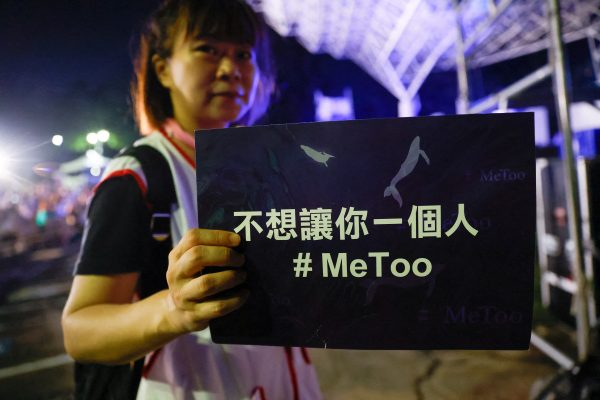As female staff of the Democratic Progressive Party (DPP) launched the first wave of sexual harassment allegations, Taiwanese President and former chairperson of the DPP Tsai Ing-wen publicly apologised and promised that the government would adopt a zero-tolerance policy on sexual harassment. Sexual harassment is prevalent in Taiwan, but Taiwanese women were not able to join their female counterparts across the globe when the #MeToo movement emerged in 2017. One might wonder why it took so long for the #MeToo movement to emerge, given Taiwan’s progressive gender equality and same-sex marriage laws.
The emergence of the #MeToo movement depends on social, cultural and legal structures. Taiwan enacted regulations to curb sexual harassment in workplaces and educational institutions in 2002 and 2004, respectively. Sexual harassment which takes place in public spheres is also punished under the 2005 Sexual Harassment Prevention Act. The Stalking and Harassment Prevention Act was enacted in 2021 to prevent excessive courting and stalking.
Ironically, the existence of multiple sexual harassment laws suggests that the legislation is not functioning properly. The plethora of regulations not only confuse ordinary people but also makes it easier for different branches of local governments to shirk their responsibilities under the web of bureaucracy. For example, the 2002 Act of Gender Equality in Employment (GEE) stipulates that any company employing more than 30 staff should adopt an anti-sexual harassment policy. Nonetheless, most Taiwanese companies do not follow the regulation.
Even the ruling DPP’s rigid internal policy against sexual harassment has put victims in jeopardy. The first wave of #MeToo cases came from female DPP employees who claimed that their formal complaints had either been dismissed or covered up by their supervisors or by the DPP Secretariat. Victims were asked to ‘think about the big picture’ — winning the election — and warned that they would be exposed if they filed a formal complaint.
Given the high stakes associated with reporting sexual harassment, most victims are unwilling to proceed through formal legal channels. Women and girls gradually learn to internalise shameful and degrading sexual encounters. The Legislative Yuan amended Taiwan’s anti-sexual harassment laws in July 2023. The GEE now covers companies that hire more than 10 people, and companies that fail to follow the law can be fined up to $NT1 million. If the perpetrators were the employers, they also could be fined up to $NT1 million. School teachers who engage in romantic or sexual relationships with underage students can also be fired according to the Gender Equal Education Act.
Sexual harassment is so prevalent in Taiwan that Taiwanese people have adopted the phrase ‘eating tofu’ to describe unwelcome social interactions faced daily by women and girls — from verbal comments regarding women’s bodies to various types of unwanted physical and sexual contact.
Taiwan’s mainstream heterosexual script expects women to embody two contradictory gender roles. On the one hand, being deemed sexually attractive under the male gaze is still a core element of femininity. On the other hand, this understanding of femininity also demands women to be sexually passive. Men are encouraged to initiate physical contact while women are expected to dodge or resist. This gendered script imposes an outdated femininity on Taiwanese women while also misrepresenting women’s refusal of unwanted sexual attention as ‘flirtation’.
The #MeToo movement has also shown men and boys to be victims of sexual harassment in workplaces, schools and universities. But the stigma surrounding same-sex desire works to silence male victims.
The risks associated with speaking up about one’s experiences of sexual harassment continue to be underestimated by mainstream society. Victims are subject to all kinds of questioning, with their motivations for making an allegation to the time elapsed between the assault and its reporting. In the digital era, many victims are subject to various rumours and defamation once they post their testimonies on social media.
The ways that Taiwanese society deals with sexual harassment not only serves to silence victims but also neglects the societal taboos preventing women and girls from talking about sex — be it sexual pleasure or violence. As women and girls are taught to associate sex with reputational damage and shame, many women have kept their stories silent until now — when the #MeToo movement has created a community that allows for their voices to be heard.
Taiwan still has a long way to go in terms of gender and sexual equality and the DPP’s ‘zero-tolerance’ policy on sexual harassment is demands that the social fabric change substantially. It would be beneficial to treat the #MeToo movement as an opportunity to create space for women and girls to talk about their experiences and for collective work to be done on how society can better support and rehabilitate victims.
Mei-Hua Chen is Professor in the Department of Sociology at National Sun Yat-sen University, Taiwan.

